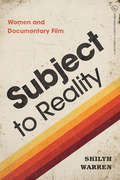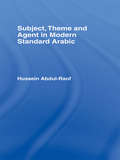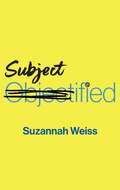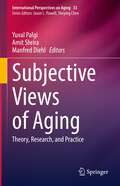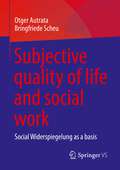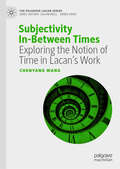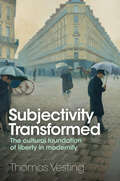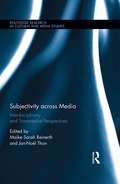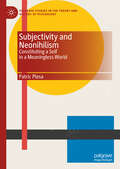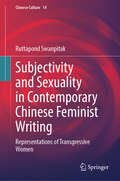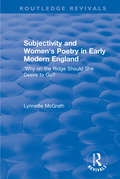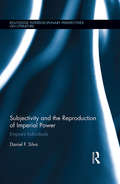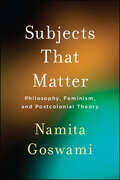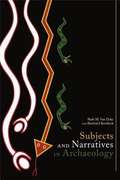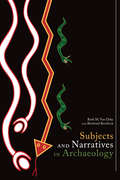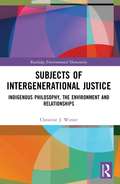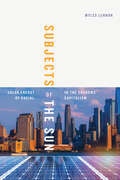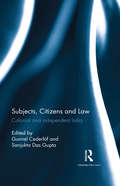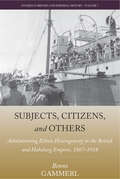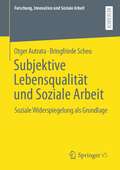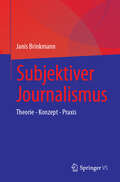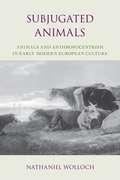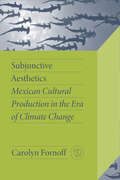- Table View
- List View
Subject to Reality: Women and Documentary Film (Women & Film History International)
by Shilyh WarrenRevolutionary thinking around gender and race merged with new film technologies to usher in a wave of women's documentaries in the 1970s. Driven by the various promises of second-wave feminism, activist filmmakers believed authentic stories about women would bring more people into an imminent revolution. Yet their films soon faded into obscurity. Shilyh Warren reopens this understudied period and links it to a neglected era of women's filmmaking that took place from 1920 to 1940, another key period of thinking around documentary, race, and gender. Drawing women’s cultural expression during these two explosive times into conversation, Warren reconsiders key debates about subjectivity, feminism, realism, and documentary and their lasting epistemological and material consequences for film and feminist studies. She also excavates the lost ethnographic history of women's documentary filmmaking in the earlier era and explores the political and aesthetic legacy of these films in more explicitly feminist periods like the Seventies. Filled with challenging insights and new close readings, Subject to Reality sheds light on a profound and unexamined history of feminist documentaries while revealing their influence on the filmmakers of today.
Subject, Theme and Agent in Modern Standard Arabic
by Hussein Abdul-RaofInvestigates the universal categories 'subject', 'theme', and 'agent' with special reference to their functional status in Modern Standard Arabic (MSA) and how these three distinct functions may or may not coincide in Arabic sentences. These functions are inexplicitly characterised by classical and modern Arab linguists and Arabists alike.It has been found that the pre- (viz. sentence - initial) or post-verbal noun phrase (NP) in Arabic can be assigned the syntactic function 'subject' but may not necessarily assume the semantic function 'agent', that the pre-verbal NP, which may not necessarily be the 'subject', has the pragmatic function 'theme', and that these distinct functions sometimes cluster around a single NP in certain sentences, depending on genre.It has also been found that in MSA the order of sentence constituents is relatively free, subject to a verb-initial preference, especially when needed to prevent ambiguity.The present study reveals the fact that although coding features such as word order, case marking, and cross-referencing (viz. agreement) may provide a clear indication of which NPs are 'subjects' in MSA, they do not provide a clear-cut indication of semantic relations such as 'agent'; the 'subject' position in MSA is not necessarily the canonical 'agent' position.
Subjectified: Becoming a Sexual Subject
by Suzannah WeissSubjectified is a book about subjects, objects, and verbs. It is also a book about clothing-optional resorts, group masturbation circles, and sex parties. Suzannah Weiss takes the reader through her adventures as a sex and relationship writer to explore how we can create a world with less objectification and more subjectification — placing women and other marginalized groups in the subject role of sentences and actions. Offering a deeply personal account and powerful critique of sexual empowerment movements, Suzannah Weiss presents a way forward that focuses more on what women desire, and less on what men desire from them. She makes a bold yet compassionate call for women everywhere to inhabit their bodies and hearts — to remain connected to their inner eye and their inner "I," even in a world where they are disproportionately "you," "she," or "them." The book is for everybody wanting to understand themselves better as subjects. Wholeheartedly, the author invites you to follow her search for subjecthood and, should you desire, forge your own path out of objecthood.
Subjective Views of Aging: Theory, Research, and Practice (International Perspectives on Aging #33)
by Manfred Diehl Yuval Palgi Amit ShriraThis book focuses on the concept of subjective views of aging. This concept refers to the way individuals conceptualize and perceive the aging process. Social and cultural perceptions regarding older adults are incorporated and internalized into views people hold regarding their own aging process. The book contains three parts which present theoretical, empirical, and translational perspectives about subjective views of aging. The theoretical section expands the framework of subjective views of aging with the inclusion of additional concepts, and further integrates these concepts by accounting for their synergistic effects. The empirical section presents recent developments in the field starting at the intra-individual level as assessed by ecological momentary assessments, going through the level of interpersonal relationships, and concluding at the social and cultural levels. Finally, the translational section presents recent endeavours to develop interventions aimed at advancing favourable views of aging. This cutting-edge edited book includes chapters written by internationally renowned scholars in the field and serves as an up-to-date resource for scholars in the field as well as a textbook for students in courses like social gerontology, lifespan psychology, and life course sociology.
Subjective quality of life and social work: Social Widerspiegelung as a basis
by Bringfriede Scheu Otger AutrataSocial Widerspiegelung is a central area of human life, however, it has been little researched for the theorization of social work. Otger Autrata and Bringfriede Scheu present the foundations of social Widerspiegelung and establish the essential connection between social Widerspiegelung and subjective quality of life. This makes an important contribution to the development of social work theory: The basic research on social Widerspiegelung is linked to the tasks of social work in discipline and profession.
Subjectivity In-Between Times: Exploring the Notion of Time in Lacan’s Work (The Palgrave Lacan Series)
by Chenyang WangThis book is the first to systematically investigate how the notion of time is conceptualised in Jacques Lacan’s work. Through a careful examination of Lacan’s various presentations of time, Chenyang Wang argues that this notion is key to a comprehension of Lacan’s psychoanalytic thinking, and in particular to the way in which he theorises subjectivity. This book demonstrates that time is approached by Lacan not only as consciously experienced, but also as pre-reflectively embodied and symbolically generated. In an analysis that begins with Lacan’s “Logical Time” essay, Chenyang Wang articulates three temporal registers that correspond to Lacan's Real-Symbolic-Imaginary triad and also demonstrates how Lacan’s elaboration of other major themes including consciousness, body, language, desire and sexuality is informed by his original perspectives on time. Filling a significant gap in contemporary Lacanian studies, this book will provide essential reading for students and scholars of psychoanalytic theory, continental philosophy and critical theory.
Subjectivity Transformed: The Cultural Foundation of Liberty in Modernity
by Thomas VestingThis book provides a historically informed reconstruction of the social practices that have shaped the formation of the modern subject from the early modern period to the present. The formal legal protections accorded to subjects are, and always have been, latent in social practices, norms, and language before they are articulated in formal legal orders. Vesting argues that in Western societies legal personhood is closely tied to three ideal types of social personhood – what he calls the gentleman, the manager, and Homo digitalis. By examining these three ideal types and their emergence in society, we can see that Western formal law does not bring these ideal types into being but, on the contrary, they arise from the social and cultural conditions that they generate and reflect. Correspondingly, Western legal personhood, or “legal subjectivity,” arises from the history and culture of Western nations, not the other way around. Therefore, signature features of Western formal law, particularly its valorization of the rights of persons (whether natural or nonnatural), come from the particular sociohistorical cultural developments that had already generated the strong ideas of social personhood inherent in the ideal types of the gentleman, the manager, and Homo digitalis. Subjectivity Transformed is a major contribution to legal and social theory and, with its original analysis of the formation of modern subjectivity, it will be of interest to students and scholars throughout the social sciences and humanities.
Subjectivity across Media: Interdisciplinary and Transmedial Perspectives (Routledge Research in Cultural and Media Studies)
by Jan-Noël Thon Maike Sarah ReinerthMedia in general and narrative media in particular have the potential to represent not only a variety of both possible and actual worlds but also the perception and consciousness of characters in these worlds. Hence, media can be understood as "qualia machines," as technologies that allow for the production of subjective experiences within the affordances and limitations posed by the conventions of their specific mediality. This edited collection examines the transmedial as well as the medium-specific strategies employed by the verbal representations characteristic for literary texts, the verbal-pictorial representations characteristic for comics, the audiovisual representations characteristic for films, and the interactive representations characteristic for video games. Combining theoretical perspectives from analytic philosophy, cognitive theory, and narratology with approaches from phenomenology, psychosemiotics, and social semiotics, the contributions collected in this volume provide a state-of-the-art map of current research on a wide variety of ways in which subjectivity can be represented across conventionally distinct media.
Subjectivity and Neonihilism: Constituting a Self in a Meaningless World (Palgrave Studies in the Theory and History of Psychology)
by Patric PlesaSubjectivity and Neonihilism examines the current Western sociopolitical climate, revealing how it shapes who we are, how we think of ourselves, and how we create meaning in a seemingly meaningless world. Drawing on critical theory, this book looks at some of the social inequities produced under neoliberal capitalism and the ways these problems are internalized into subjectivity as the neoliberal self. Neoliberal cultural values are shown to reframe social inequities as personal problems and simultaneously create a sense of personal responsibility for solving them within the self, rather than addressing them externally. The author argues that current crises in meaning making and mental health have been exacerbated by the neoliberal values of individualization, responsibilization, self-governance, and competition. Divided into 3 parts, this book begins by outlining the emergence of subjectivity and technologies of the self. It demonstrates how the sociopolitical conditions that amplify social inequities intwine with the hyperawareness of the internet age to create an atmosphere of meaninglessness that is pervasive on social media and in internet culture. In part 2, the author further analyses this phenomenon, here labelled &‘neonihilism&’, as the process in which we confront meaninglessness through irony, questioning whether this might hold the intrinsic condition for overcoming this new nihilism. Part 3 examines the possibility for collective meaning making, solidarity, and collective action afforded by creating an art of nihilating the neoliberal self, or what the author terms &‘the ars nihil&’, via subversion and resistance. This book offers fresh insights that will be of interest to students and scholars of critical theory, psychology, philosophy and sociology.
Subjectivity and Sexuality in Contemporary Chinese Feminist Writing: Representations of Transgressive Women (Chinese Culture #14)
by Ruttapond SwanpitakThis book explores representations of female sexuality and subjectivity in contemporary Chinese fiction by three women writers, published from 1986 to 2000, from the perspective of poststructuralist feminism. It discusses the representative works of authors, Wang Anyi, Tie Ning and Chi Li, who are well known in the Chinese literary field. However, their works have not, to date, been analysed through the poststructuralist feminism’s notions of subjectivity, femininity and transgression. This book, then, provides detailed analysis of each writer and draws comparisons between their works to provide an extended consideration of female sexuality and subjectivity within post-Mao Chinese fiction. In this respect, this book not only offers fresh insights into the three authors’ fiction but also contributes to the feminist study of Chinese women’s writing. Additionally, the research contributes to a better understanding of contemporary Chinese culture in relation to patriarchy, misogyny, feminism, differences and resistance. It is relevant to scholars in the fields of China studies, Chinese literature, feminist literature and gender studies.
Subjectivity and Women's Poetry in Early Modern England: Why on the Ridge Should She Desire to Go? (Routledge Revivals)
by Lynnette McGrathThis title was first published in 2002: Combining the approaches of historic scholarship and post-structural, feminist psychoanalytic theory to late 16th- and early 17th-century poetry by women, this book aims to make a unique contribution to the field of the study of early modern women's writings. One of the first to concentrate exclusively on early modern women's poetry, the full-length critical study to applies post-Lacanian French psychoanalytic theory to the genre. The strength of this study is that it merges analysis of socio-political constructions affecting early modern women poets writing in England with the psychoanalytic insights, specific to women as subjects, of post-Lacanian theorists Luce Irigaray, Helen Cixous, Julia Kristeva, and Rosi Braidotti.
Subjectivity and the Reproduction of Imperial Power: Empire’s Individuals (Routledge Interdisciplinary Perspectives on Literature)
by Daniel F. SilvaThis book brings forth a new contribution to the study of imperialism and colonial discourse by theorizing the emergence and function of individual identity as product and producer of imperial power. While recent decades of theoretical reflections on imperialism have yielded important understandings of how the West has repeatedly reconsolidated its power, this book seeks to grasp the complex role of subjectivity in reformulating the terms of imperial domination from early modern European expansion to late capitalism. This entails approaching Empire as a constantly shifting system of differences and meanings as well as an ontological project, a mode of historical writing, and economy of desire that repeatedly envelops the subject into the realm of western power. The analysis of an array of literary texts and cultural artifacts is undertaken by means of a theoretically eclectic approach – drawing on psychoanalysis, post-structuralism, postcolonial theory, and Marxism – with the aim of forwarding current knowledge of Empire while also contributing to different branches of critical theory. In exploring the formation of imperial subjectivity in different historical moments, Silva raises new questions related to the signification of otherness in European expansion and colonial settlement, slavery and eugenics in post-independence Americas, and late capitalist circulation of bodies and commodities. The volume also covers a broad range of geo-cultural spaces in order to locate western power in time and space. This book’s diversity in terms of approach, historical scope, and cultural contexts makes it a useful tool for research and teaching among students and scholars of disciplines including Postcolonial Studies, Colonial History, Literature, and Globalization.
Subjectivity, Gender and the Struggle for Recognition
by Paddy McqueenIn this book Paddy McQueen examines the role that 'recognition' plays in our struggles to construct an identity and to make sense of ourselves as gendered beings. It analyses how such struggles for gender recognition are shaped by social discourses and power relations, and considers how feminism can best respond to these issues.
Subjects That Matter: Philosophy, Feminism, and Postcolonial Theory
by Namita GoswamiIn this ambitious book, Namita Goswami draws on continental philosophy, postcolonial criticism, critical race theory, and African American and postcolonial feminisms to offer postcoloniality as a model for philosophical practice. Moving among and between texts, traditions, and frameworks, including the work of Gayatri Spivak, Theodor Adorno, Barbara Christian, Paul Gilroy, Neil Lazarus, and Hortense Spillers, among others, she charts a journey that takes us beyond Eurocentrism by understanding postcoloniality as the pursuit of heterogeneity, that is, of a non-antagonistic understanding of difference. Recognizing that philosophy, feminism, and postcolonial theory share a common concern with the concept of heterogeneity, Goswami shows how postcoloniality empowers us to engage more productively the relationships between these disciplines. Subjects That Matter confronts the ways Eurocentrism, an identity politics that considers difference as inherently oppositional, relegates minority traditions to a diagnostic and/or corrective standpoint to prevent their general implications from playing a critical and transformative role in how we understand subjectivity and agency. Through unexpected, often surprising, and thought-provoking analytic connections and continuities, this book's interdisciplinary approach reveals a postcolonial pluralism that expands philosophical resources, confounds and limits our habitual disciplinary lexicons, and opens up new areas of inquiry.
Subjects and Narrative in Archaeology
by Reinhard Bernbeck Ruth M. Van DykeSeeking to move beyond the customary limits of archaeological prose and representation, Subjects and Narratives in Archaeology presents archaeology in a variety of nontraditional formats. The volume demonstrates that visual art, creative nonfiction, archaeological fiction, video, drama, and other artistic pursuits have much to offer archaeological interpretation and analysis.Chapters in the volume are augmented by narrative, poetry, paintings, dialogues, online databases, videos, audio files, and slideshows. The work will be available in print and as an enhanced ebook that incorporates and showcases the multimedia elements in archaeological narrative. While exploring these new and not-so-new forms, the contributors discuss the boundaries and connections between empirical data and archaeological imagination. Both a critique and an experiment, Subjects and Narratives in Archaeology addresses the goals, advantages, and difficulties of alternative forms of archaeological representation. Exploring the idea that academically sound archaeology can be fun to create and read, the book takes a step beyond the boundaries of both traditional archaeology and traditional publishing.
Subjects and Narratives in Archaeology
by Ruth M. Van Dyke and Reinhard BernbeckSeeking to move beyond the customary limits of archaeological prose and representation, Subjects and Narratives in Archaeology presents archaeology in a variety of nontraditional formats. The volume demonstrates that visual art, creative nonfiction, archaeological fiction, video, drama, and other artistic pursuits have much to offer archaeological interpretation and analysis. Chapters in the volume are augmented by narrative, poetry, paintings, dialogues, online databases, videos, audio files, and slideshows. The work will be available in print and as an enhanced ebook that incorporates and showcases the multimedia elements in archaeological narrative. While exploring these new and not-so-new forms, the contributors discuss the boundaries and connections between empirical data and archaeological imagination. Both a critique and an experiment, Subjects and Narratives in Archaeology addresses the goals, advantages, and difficulties of alternative forms of archaeological representation. Exploring the idea that academically sound archaeology can be fun to create and read, the book takes a step beyond the boundaries of both traditional archaeology and traditional publishing.
Subjects of Intergenerational Justice: Indigenous Philosophy, the Environment and Relationships (Routledge Environmental Humanities)
by Christine J. WinterThis book challenges mainstream Western IEJ (intergenerational environmental justice) in a manner that privileges indigenous philosophies and highlights the value these philosophies have for solving global environmental problems. Divided into three parts, the book begins by examining the framing of Western liberal environmental, intergenerational and indigenous justice theory and reviews decolonial theory. Using contemporary case studies drawn from the courts, film, biography and protests actions, the second part explores contemporary Māori and Aboriginal experiences of values-conflict in encounters with politics and law. It demonstrates the deep ontological rifts between the philosophies that inform Māori and Aboriginal intergenerational justice (IJ) and those of the West that underpin the politics and law of these two settler states. Existing Western IEJ theories, across distributional, communitarian, human rights based and the capabilities approach to IJ, are tested against obligations and duties of specific Māori and Aboriginal iwi and clans. Finally, in the third part, it explores the ways we relate to time and across generations to create regenerative IJ. Challenging the previous understanding of the conceptualization of time, it posits that it is in how we relate—human to human, human to nonhuman, nonhuman to human—that robust conceptualization of IEJ emerges. This volume presents an imagining of IEJ which accounts for indigenous norms on indigenous terms and explores how this might be applied in national and international responses to climate change and environmental degradation. Demonstrating how assumptions in mainstream justice theory continue to colonise indigenous people and render indigenous knowledge invisible, this book will be of great interest to students and scholars of environmental and intergenerational philosophy, political theory, indigenous studies and decolonial studies, and environmental humanities more broadly.
Subjects of the Sun: Solar Energy in the Shadows of Racial Capitalism (Elements)
by Myles LennonIn the face of accelerating climate change, anticapitalist environmental justice activists and elite tech corporations increasingly see eye to eye. Both envision solar-powered futures where renewable energy redresses gentrification, systemic racism, and underemployment. However, as Myles Lennon argues in Subjects of the Sun, solar power is no less likely to exploit marginalized communities than dirtier forms of energy. Drawing from ethnographic research on clean energy corporations and community solar campaigns in New York City, Lennon argues that both groups overlook solar’s extractive underside because they primarily experience energy from the sun in the virtual world of the cloud. He shows how the material properties of solar technology—its shiny surfaces, decentralized spatiality, and modularity—work closely with images, digital platforms, and quantitative graphics to shape utopic visions in which renewable energy can eradicate the constitutive tensions of racial capitalism. As a corrective to this virtual world, Lennon calls for an equitable energy transition that centers the senses and sensibilities neglected by screenwork: one’s haptic care for their local environment; the full-bodied feel of infrastructural labor; and the sublime affect of the sun.
Subjects, Citizens and Law: Colonial and independent India
by Gunnel Cederlöf Sanjukta Das GuptaThis volume investigates how, where and when subjects and citizens come into being, assert themselves and exercise subjecthood or citizenship in the formation of modern India. It argues for the importance of understanding legal practice – how rights are performed in dispute and negotiation – from the parliament and courts to street corners and field sites. The essays in the book explore themes such as land law and rights, court procedure, freedom of speech, sex workers’ mobilisation, refugee status, adivasi people and non-state actors, and bring together studies from across north India, spanning from early colonial to contemporary times. Representing scholarship in history, anthropology and political science that draws on wide-ranging field and archival research, the volume will immensely benefit scholars, students and researchers of development, history, political science, sociology, anthropology, law and public policy.
Subjects, Citizens, and Others: Administering Ethnic Heterogeneity in the British and Habsburg Empires, 1867-1918 (Studies in British and Imperial History #7)
by Benno GammerlBosnian Muslims, East African Masai, Czech-speaking Austrians, North American indigenous peoples, and Jewish immigrants from across Europe—the nineteenth-century British and Habsburg Empires were characterized by incredible cultural and racial-ethnic diversity. Notwithstanding their many differences, both empires faced similar administrative questions as a result: Who was excluded or admitted? What advantages were granted to which groups? And how could diversity be reconciled with demands for national autonomy and democratic participation? In this pioneering study, Benno Gammerl compares Habsburg and British approaches to governing their diverse populations, analyzing imperial formations to reveal the legal and political conditions that fostered heterogeneity.
Subjektive Lebensqualität und Soziale Arbeit: Soziale Widerspiegelung als Grundlage (Forschung, Innovation und Soziale Arbeit)
by Bringfriede Scheu Otger AutrataSoziale Widerspiegelung ist ein zentraler Bereich menschlichen Lebens, allerdings ist diese bisher für die Theoriebildung Sozialer Arbeit wenig erforscht. Otger Autrata und Bringfriede Scheu stellen Grundlagen sozialer Widerspiegelung dar und stellen den essentiellen Zusammenhang von sozialer Widerspiegelung und subjektiver Lebensqualität her. Damit wird ein wichtiger Beitrag zur Entfaltung von Theorie Sozialer Arbeit geleistet: Die Grundlagenforschung zu sozialer Widerspiegelung wird verknüpft mit den Aufgabenstellungen der Sozialen Arbeit in Disziplin und Profession.
Subjektiver Journalismus: Theorie - Konzept - Praxis
by Janis BrinkmannJournalismus wandelt sich – und bringt zunehmend neue Formen und Formate hervor, die u.a. investigative, narrative, interpretative oder partizipative Muster, Mechanismen und Merkmale des Journalismus integrieren und neu arrangieren. Doch wie sich ein teils explizit subjektiver und meinungsbasierter „Neuer Journalismus“ entwickelt und in der Praxis an Einfluss gewinnt, ist angesichts der oft fluiden Forschungsgegenstände in der Journalistik bislang nicht erforscht. Die vorliegende Studie, die am Institut für Journalistik an der Fakultät Kulturwissenschaften der Technischen Universität Dortmund als Habilitationsschrift eingereicht wurde, widmet sich daher Programmen, Praktiken und Leistungspotenzialen eines subjektiven Journalismus, wie er sich gegenwärtig in Formen des Social Journalism vollzieht (z.B. bei funk, Vice, BuzzFeed), der über soziale Medien jüngere Zielgruppen adressiert und sich radikal an deren Thematisierungs-, Präsentations-, Nutzungs- und Rezeptionserwartungen orientiert.Vor einer konstruktivistisch geprägten Hintergrundfolie wird zunächst ein integrativ-intergrativer Theorierahmen aufgespannt, der strukturell-individualistische mit figurations-analytischen und praxistheoretischen Bausteinen verknüpft, um die Konstruktionsprogramme, Praxiskonstellationen und Leistungspotenziale von Formen des subjektiven Journalismus zu rekonstruieren, zu analysieren und zu bewerten. Dafür wird ein triangulatives Methodendesign gewählt: Anhand kontemporärer Angebote eines subjektiven Journalismus, der sich besonders augenfällig in den Presenter-Reportagen des öffentlich-rechtlichen Content-Netzwerks funk manifestiert, werden Programme, Praktiken und Potenziale des subjektiven Journalismus durch quantitative und qualitative Inhaltsanalysen sowie eine flankierende Expert:innen-Befragung beteiligter Journalist:innen untersucht, um daraus Muster, Mechanismen und Merkmale eines „Neuen Journalismus“ zu destillieren. Als zentrales Ergebnis der Studie gewinnt eine nach den Mechanismen sozialer Medien für junge Zielgruppen aktualisierte und modifizierte Form des radikal subjektiven New Journalism an Kontur: Journalistische Wirklichkeit konstruieren Reporter:innen über eine an Zielgruppen- und Lebenswelt-Themen junger Publika orientierte Thematisierung, hybride Web-Reportagen, die konsequent eigene Meinung bzw. Haltung sowie subjektive Perspektiven integrieren sowie eine starke Fokussierung auf sich selbst und auf Protagonist:innen als Quellen und Akteure. Die Unterschiede zwischen verschiedenen empirisch rekonstruierbaren subjektiven Journalismen wie die eher reporter- bzw. recherche-getriebenen Slow Journalism und Gonzo-Journalismus oder die stärker protagonisten- bzw. emotions-getriebenen empathischer Journalismus und Selfie-Journalismus lassen sich am Beispiel der ausgewählten funk-Formate Y-Kollektiv, STRG_F, reporter, follow me.reports und Die Frage prägnant herausarbeiten. Für subjektiv modifizierte Praktiken wie thesengeleitete Recherche, interpretatives Storytelling, On-Presenting oder ein reflexives Framing greifen die Reporter:innen auf Modalitäten von Signifikationsregeln und autoritative Ressourcen wie persönliche Erfahrungen und Erlebnisse, eigene Meinungen und Haltungen sowie subjektive Darstellungs- und Erzählmuster zurück, die zu einem nunmehr artifiziell inszenierten und nicht länger authentisch konstruierten „strategischen Ritual“ der Subjektivität degenerieren, wenn Praxiskonstellationen wie die storybasierte Enthüllung, teilnehmende Beobachtung, emotionale Befragung oder selbstzentrierte Begleitung repetitiv Subjektivität in alle journalistischen Praktiken weben.
Subjugated Animals: Animals And Anthropocentrism in Early Modern European Culture
by Nathaniel WollochThis book is a study of attitudes toward animals in early modern Western culture. Emphasizing the influence of anthropocentrism on attitudes toward animals, historian Nathaniel Wolloch traces the various ways in which animals were viewed, from predominantly anti-animal thinking to increasingly pro-animal sentiments and viewpoints.Wolloch devotes a chapter each to six major themes: early modern philosophical perspectives on animals till the end of the seventeenth century, pro-animal opinions in the eighteenth-century, the connection between attitudes toward animals and the early modern debate about the existence of extraterrestrial life, scientific modes of discussing animals, the role of animals in early modern anthropomorphic literature, and depictions of animals in seventeenth-century Dutch and Flemish painting.He concludes his broad, interdisciplinary study by linking these historical trends to the modern discussion of animal rights and ecological issues.
Subjunctive Aesthetics: Mexican Cultural Production in the Era of Climate Change (Critical Mexican Studies)
by Carolyn FornoffDuring the twenty-first century, Mexico has escalated extractive concessions at the same time that it has positioned itself as an international leader in the fight against climate change. Cultural production emergent from this contradiction frames this impasse as a crisis of imagination. Subjunctive Aesthetics studies how contemporary writers, filmmakers, and visual artists grapple with the threat that climate change and extractivist policies pose to Mexico's present and future. It explores how artists rise to the challenge of envisioning alternative forms of territoriality (ways of being in relation to the environment) through strategies ranging from rewriting to counterfactual speculation. Whereas ecocritical studies have often focused on art's evidentiary role—its ability to visualize and prove the urgency of environmental damage—author Carolyn Fornoff argues that what unites the artists under consideration is their use of more hypothetical, uncertain representational modes, or "subjunctive aesthetics." In English, the subjunctive is a grammatical mode that articulates the imagined, desired, and possible. In the Spanish language, it is even more widely used to express doubts, denials, value judgments, and emotions. Each chapter of Subjunctive Aesthetics takes up one of these modalities to examine how Mexican artists, writers, and filmmakers activate approaches to the planet not just as it is, but as it could be or should be.
Sublime Dreams of Living Machines: The Automaton in the European Imagination
by Minsoo KangFrom the dawn of European civilization to the twentieth century, the automaton—better known today as the robot—has captured the Western imagination and provided a vital lens into the nature of humanity. Historian Minsoo Kang argues that to properly understand the human-as-machine and the human-as-fundamentally-different-from-machine, we must trace the origins of these ideas and examine how they were transformed by intellectual, cultural, and artistic appearances of the automaton throughout the history of the West. Kang tracks the first appearance of the automaton in ancient myths through the medieval and Renaissance periods, marks the proliferation of the automaton as a central intellectual concept in the Scientific Revolution and the subsequent backlash during the Enlightenment, and details appearances in Romantic literature and the introduction of the living machine in the Industrial Age. He concludes with a reflection on the destructive confrontation between humanity and machinery in the modern era and the reverberations of the humanity-machinery theme today. Sublime Dreams of Living Machines is an ambitious historical exploration and, at heart, an attempt to fully elucidate the rich and varied ways we have utilized our most uncanny creations to explore essential questions about ourselves.
